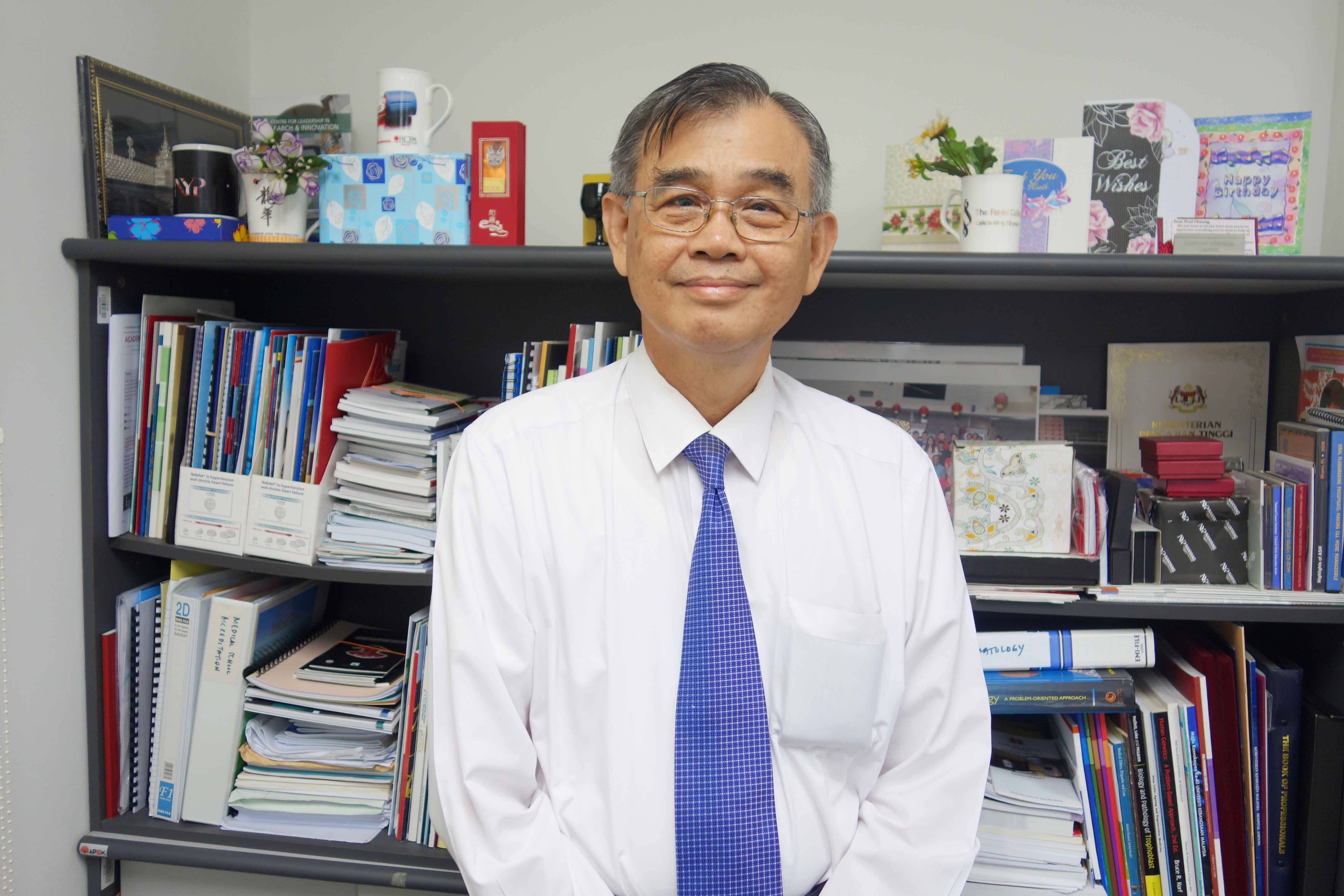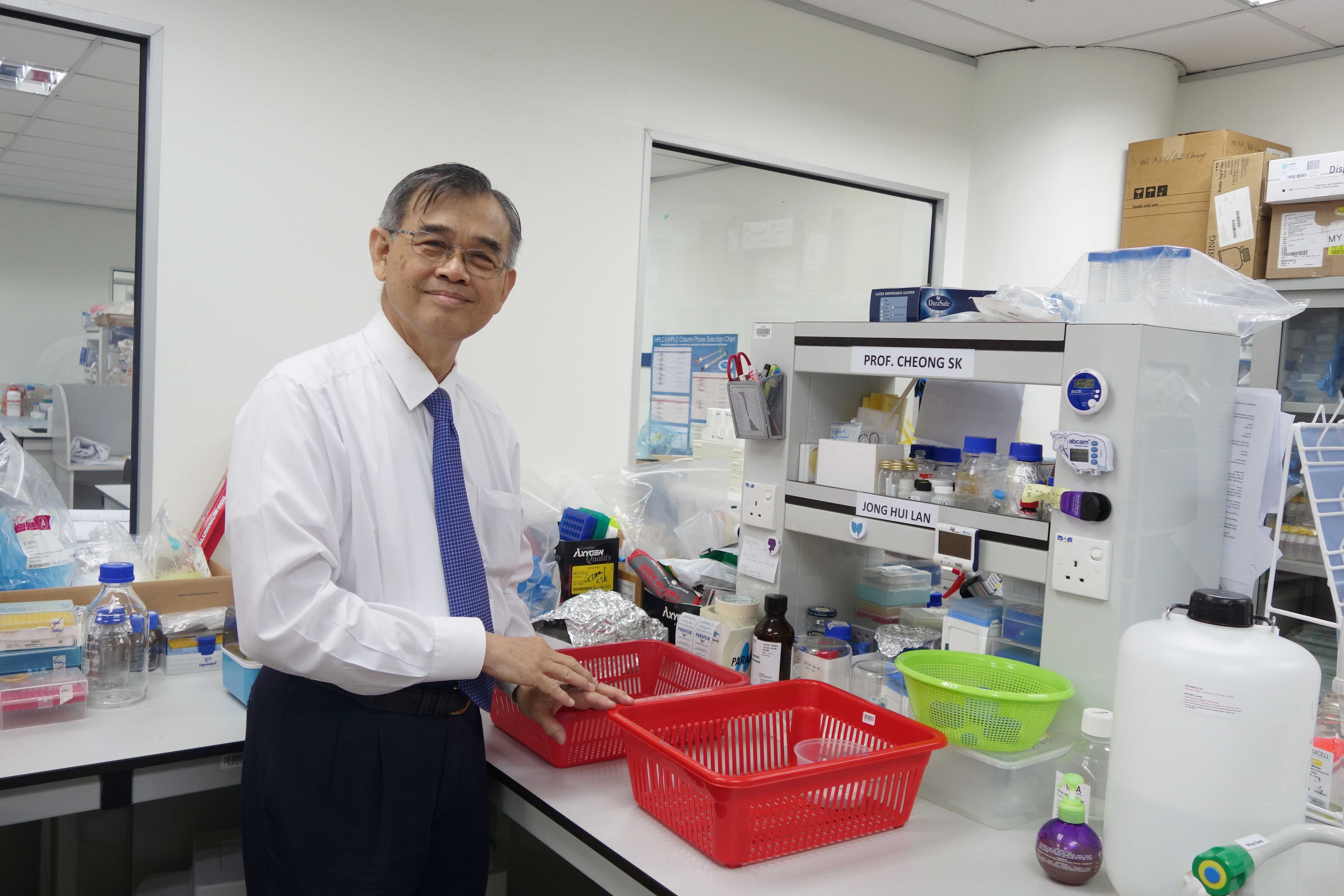


FMHS Dean Emeritus Senior Prof Dr Cheong Soon Keng
With over 40 years of experience in the medical field, Faculty of Medicine and Health Sciences (FMHS) Dean Emeritus Senior Prof Dr Cheong Soon Keng has contributed to a wide knowledge in the area of clinical medicine and pathology. His interest was initially to study stem cells. Prior to his retirement from UKM, he focused on one type of stem cell within the bone marrow known as hematopoietic stem cells (HSCs), which form all the types of blood cells in the body.
“When I was a medical student, leukaemia was known to be a deadly disease. If you were diagnosed with leukaemia, you would succumb to death within two months. Thus, a lot of research and effort were put in to discover treatment methods that would cure them. An HSC transplant is considered as the most advanced method to treat leukaemia where the bone marrow function fails because of the disease. Thus, it is not surprising the discoverer, Sir Donnal Thomas was honoured with the Nobel Prize in 1990,” explained Prof Cheong.
Referred to as "the cancer of the blood", leukaemia is a progressive disease in which the bone marrow produces increased numbers of immature or abnormal white cells that would damage the blood formation and immune systems. Prof Cheong indicated that the survival rate for a leukaemia patient continues to improve. Now, early treatment with chemotherapy is highly effective for patients to live longer and HSC transplantation has in fact cured many patients.
Mesenchymal stem cells (MSCs), also known as bone marrow stromal cells, are one of Prof Cheong’s current research interests. MSCs are multipotent stem cells also found in the bone marrow, important for making and repairing structural tissues such as cartilage, bone, fat and blood vessel. It was originally Prof Cheong’s new research area just before his retirement in 2005, but he continued to work on these cells and had successfully commercialised the cellular products with industry partners.
Another research that Prof Cheong has recently put in a lot of effort is Induced Pluripotent Stem Cells (iPSCs). His interest in this area came about when a paper regarding this pluripotent stem cell was first published by the Nobel Prize laureate Professor Shinya Yamanaka and his team from Japan.
“The research was initially dealt with using animal cells in 2006,where the paper described the generation of iPSC derived from mouse fibroblast cells. I started to develop an interest on iPSC after Professor Yamanaka, who was awarded the Nobel Prize in 2012 for his tremendous achievement, experimented the same thing on the human adult skin cells in 2007,” said Prof Cheong.
He then explained the reason to why he was fascinated by the research, “iPSC is also a mother of all cells. It has the ability to differentiate into any of the 200 types of the human body cells. This cell could be transformed into the skin if you want, it could also be developed into nails, eyes, or even the heart. That is the fantastic thing about it.”
Prof Cheong was not able to work on the cells of promise as he could not obtain funding support until he met his former student who is currently a bone and joint surgeon and shared with him the idea of reprogramming adult cells to become stem cells. They grouped together as a research team and finally were able to secure a substantial amount of research fund. Their initial effort to make iPSC was unsuccessful until they sought the advice from a Japanese friend who worked in the same field. It then inspired them to find out the issues that had bogged down the research. Through indefatigable effort, they finally successfully grew the iPSCs in UTAR research laboratory and became the first group to grow the iPSCs in Malaysia.
Prof Cheong mentioned, “In any given research, funding it is one of the many critical aspects which every researcher should consider as it keeps the research going.”
“I do not work alone as I have many collaborators who are specialised in different areas and are able to contribute towards the project we are involved in. We strive on to answer our research question as well as generate communications and publications to share knowledge regardless of the challenges we face,” said Prof Cheong when asked about meeting challenges in pursuing research.
“As a researcher, I enjoy exploring the unknown and I approach it as a mode of achieving my happiness. Doing the iPSC has brought me a great sense of satisfaction when the repeated failures were converted to success,” said Prof Cheong. He then added, “It is also a great pleasure for me to be able to make my contribution in the education field by generating professionals such as scientists, doctors, nurses, physiotherapists, and Chinese physicians that will meet the country’s present and future needs.”

Prof Cheong during the lab tour
© 2019 UNIVERSITI TUNKU ABDUL RAHMAN DU012(A).
Wholly owned by UTAR Education Foundation Co. No. 578227-M LEGAL STATEMENT TERM OF USAGE PRIVACY NOTICE